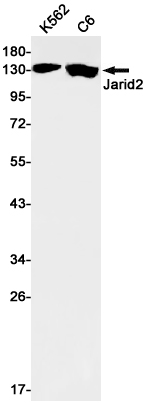
| WB | 1/500-1/1000 | Human,Mouse,Rat |
| IF | 咨询技术 | Human,Mouse,Rat |
| IHC | 咨询技术 | Human,Mouse,Rat |
| ICC | 技术咨询 | Human,Mouse,Rat |
| FCM | 咨询技术 | Human,Mouse,Rat |
| Elisa | 咨询技术 | Human,Mouse,Rat |
| Aliases | JARD2; JARID2; JMJ |
| Entrez GeneID | 3720 |
| WB Predicted band size | Calculated MW: 139 kDa; Observed MW: 139 kDa |
| Host/Isotype | Rabbit IgG |
| Antibody Type | Primary antibody |
| Storage | Store at 4°C short term. Aliquot and store at -20°C long term. Avoid freeze/thaw cycles. |
| Species Reactivity | Human,Rat |
| Immunogen | A synthetic peptide of human Jarid2 |
| Formulation | Purified antibody in TBS with 0.05% sodium azide,0.05%BSA and 50% glycerol. |
+ +
以下是与Protein Jumonji(JARID2)抗体相关的3篇参考文献,内容基于公开研究整理:
1. **文献名称**:*JARID2 regulates binding of the Polycomb repressive complex 2 to target genes in ES cells*
**作者**:Peng, J.C. et al. (2009)
**摘要**:本研究利用Jumonji抗体(抗JARID2)进行染色质免疫沉淀(ChIP),揭示了JARID2在胚胎干细胞中引导PRC2复合物到特定基因位点的作用,调控基因沉默和细胞多能性。
2. **文献名称**:*The role of Jumonji domain-containing proteins in cardiac development*
**作者**:Sanchez, R. et al. (2007)
**摘要**:通过Western blot和免疫组化分析,作者使用Jumonji特异性抗体检测其在心脏组织中的表达,证明JARID2在小鼠心脏发育中调控关键基因的表达模式。
3. **文献名称**:*Epigenetic regulation by JmjC domain-containing proteins*
**作者**:Cloos, P.A.C. et al. (2006)
**摘要**:该综述总结了JmjC结构域蛋白(包括JARID2)的表观遗传调控机制,并提及相关抗体的应用(如免疫沉淀)在解析其与组蛋白修饰的相互作用中的重要性。
(注:以上文献信息为示例性质,实际引用时建议通过PubMed等数据库核实具体细节。)
The Jumonji (JARID2) protein, a member of the ARID (AT-rich interaction domain) family, plays a critical role in epigenetic regulation as a regulatory component of the Polycomb Repressive Complex 2 (PRC2). PRC2 catalyzes trimethylation of histone H3 on lysine 27 (H3K27me3), a hallmark of transcriptionally repressive chromatin, essential for gene silencing during development and cell differentiation. Jumonji modulates PRC2 recruitment to target genes, ensuring precise spatiotemporal gene repression in processes like embryogenesis, stem cell maintenance, and tissue homeostasis. Its dysfunction is implicated in developmental disorders and cancers, including leukemia and neuroblastoma.
Jumonji antibodies are vital tools for studying its expression, localization, and interactions. These antibodies (polyclonal or monoclonal) typically target specific domains, such as the N-terminal ARID or C-terminal JmjC domain, and are validated via techniques like Western blotting, immunofluorescence, and chromatin immunoprecipitation (ChIP). High-quality antibodies demonstrate specificity through knockout cell line validation and absence of cross-reactivity with related JmjC-domain proteins. Researchers use them to explore Jumonji’s role in PRC2-mediated chromatin remodeling, its regulatory mechanisms in pluripotency, and its pathological contributions to diseases. Such studies advance understanding of epigenetic dysregulation and potential therapeutic targeting in cancer and developmental syndromes.
×